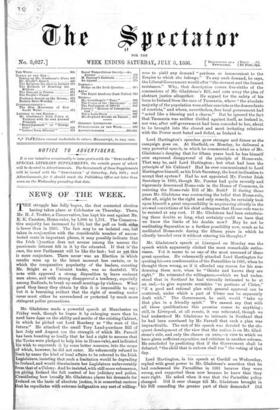Mr. Gladstone made a powerful speech at Manchester on Friday
week, though he began it by enlarging more than he need have dune on the ability and merits of the existing Cabinet, in which he picked out Lord Rosebery as " the man of the future." He attacked the small Tory Land-purchase Bill of last July and August (on the strength of which Mr. Parnell has been boasting so loudly that he had a right to assume that the Tories were pledged to help him to Home-rule), and indicated his wish to supersede it by some better measure, into the scope of which, however, he did not enter. He vehemently refused to limit by name the kind of local affairs to be referred to the Irish Legislature, insisting that such a limitation would be degrading to Ireland, and would discriminate her Legislature unfavourably rom that of a Colony. And he insisted, with still more vehemence, n giving Ireland the full control of her judiciary and police.
onsidering how broadly Mr. Gladstone places his demands for reland on the basis of absolute justice, Ms somewhat curious hat he repudiates with extreme indignation any sort of willing- ness to yield any demand " perilous or inconvenient to the Empire to which she belongs." To any such demand, he says, the Liberal Government would offer " the sternest and the firmest resistance." Why, that description covers five-sixths of the concessions of Mr. Gladstone's Bill, and cats away the plea of abstract justice altogether. He argued for the safety of his boon to Ireland from the case of Tasmania, where " the absolute majority of the population were either convicts or the descendants of convicts," and where, nevertheless, free local government had "acted like a blessing and a charm." But he ignored the fact that Tasmania was neither divided against itself, as Ireland is, nor was, after self-government had been conceded to her, aboitt to be brought into the closest and most irritating relations with the Power most hated and defied, as Ireland is.


































